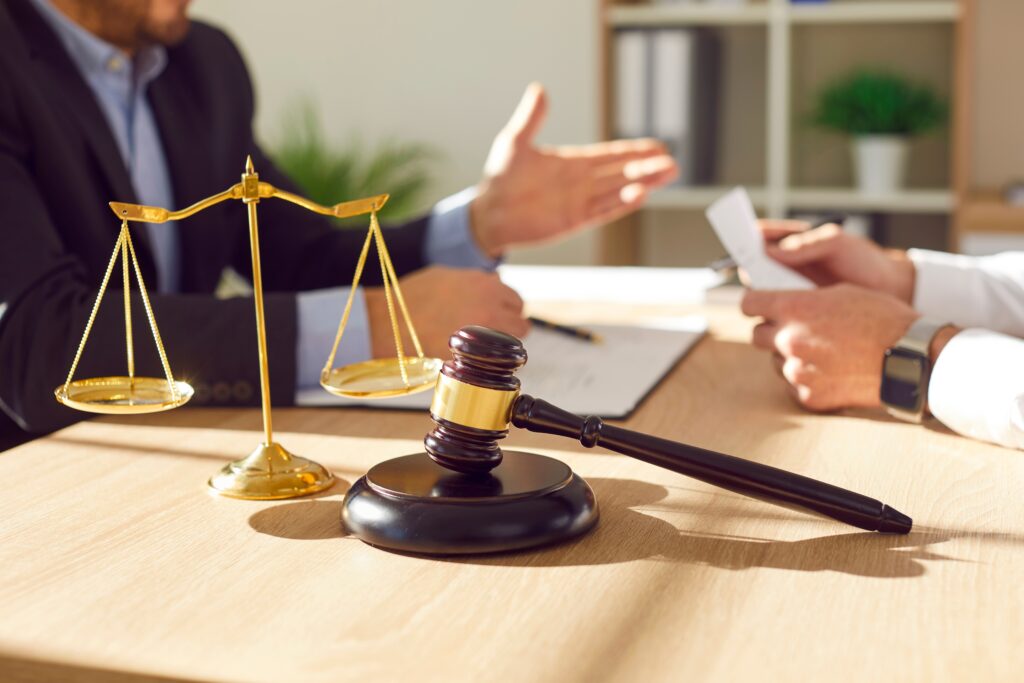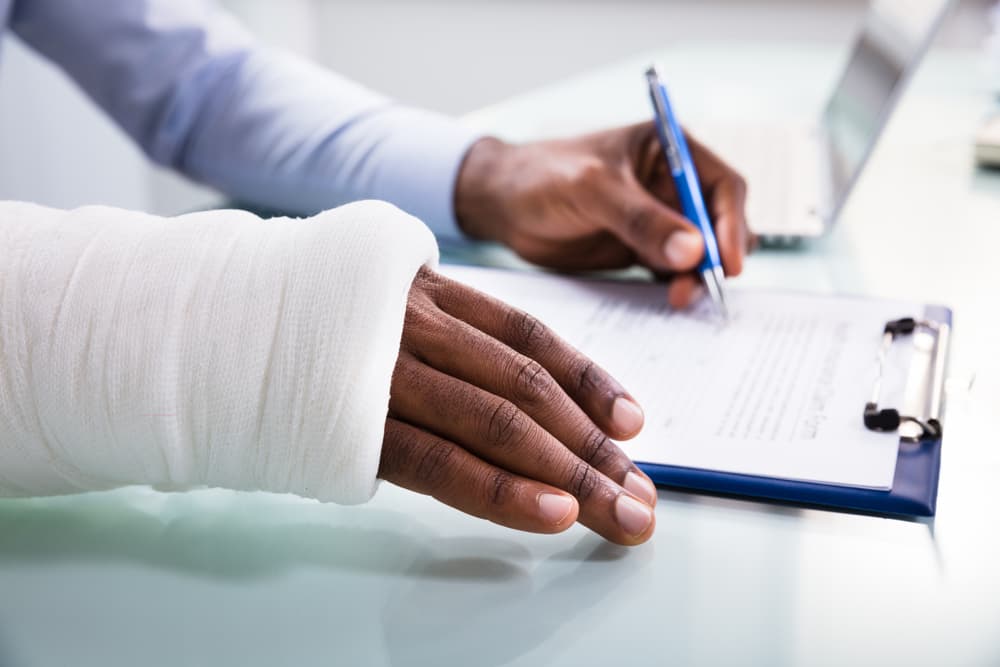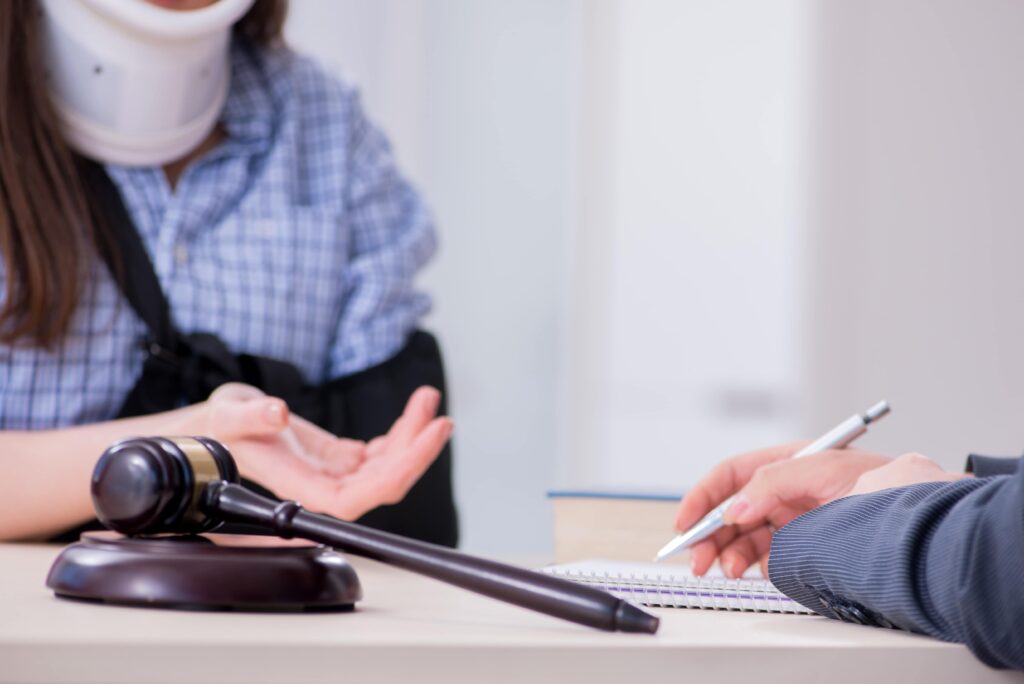If you have an accident where someone suffers an injury, prompt action is necessary to ensure the well-being of all parties involved. Aside from seeking the appropriate level of medical care, reaching out to a personal injury attorney near you should be a top priority. An experienced personal injury attorney can guide you through the legal process, help protect your rights, and potentially assist in obtaining compensation for any damages inflicted. Remember, seeking legal advice is a proactive step to ensure you take the necessary steps to address the situation responsibly and ethically.
Reach Out Today!
Common Accident Injuries
Accidents can result in a wide range of injuries, varying from minor to severe, depending on the nature of the incident. While every accident is unique, certain injuries are more commonly associated with specific accidents, such as car crashes, slips, falls, or workplace mishaps. Here are some of the most common accident-related injuries:
- Head and Traumatic Brain Injuries (TBI): Caused by head impacts during car accidents, falls or being struck by objects.
- Neck and Whiplash Injuries: Caused by sudden jerking motions, often in rear-end car collisions or falls.
- Spinal Cord and Back Injuries: Caused by high-impact accidents, heavy lifting, or slips and falls.
- Broken Bones and Fractures: Caused by falls, car crashes, or workplace accidents involving heavy machinery.
- Soft Tissue Injuries: These are caused by sudden impacts or twisting motions, often in slips and falls or car accidents.
- Burns: Car accidents involving fires, workplace incidents with chemicals, and electrical accidents cause these.
- Internal Injuries: Caused by blunt force trauma in car accidents, falls, or workplace accidents.
Why Seeking Medical Attention Is Imperative
Regardless of the type of injury, seeking immediate medical care after an accident is essential. Even injuries that seem minor initially can worsen over time. Prompt diagnosis and treatment ensure better recovery outcomes and provide critical legal or insurance claims documentation.
Avoid Certain Mistakes
Don't Admit Fault
Avoid apologizing or admitting responsibility at any point, as this can harm your legal position. Unfortunately, admitting fault, even unintentionally, such as being sorry for what happened or someone’s injuries, can be used against you during insurance negotiations or legal proceedings.
Be Cautious with Statements
When speaking to law enforcement, others involved in the accident, and insurance adjustors of other parties besides your injury attorney, be cautious with your statements. Stick to factual observations about the accident and avoid speculating or providing inaccurate information.
Don't Negotiate on the Spot
While it may be tempting to resolve the matter informally without involving insurance or legal representation, avoid negotiating on the spot or soon after. Premature negotiations can put you at a disadvantage and may lead to accepting inadequate compensation for your damages or even admitting fault. Consult with a personal injury attorney before negotiations.
Avoid Social Media Pitfalls
In today's digital age, being cautious about what you post on social media after an accident is important. Insurance companies and defense attorneys often monitor social media profiles to gather evidence they can use against you. Avoid discussing the accident or your injuries on social media, and be mindful of potential pitfalls that may harm your case.
Notify the Authorities and Your Insurance Company
In cases of injuries or significant property damage, remember to involve law enforcement and file an official police report. Police reports provide valuable evidence for insurance claims and can be instrumental in legal cases. They document the details of the accident, gather witness statements, and may contain the officer's assessment of fault. If you have not contacted law enforcement, it’s in your best interest to do so as soon as possible.
Informing Your Insurance Provider
Another key step is promptly notifying your insurance company about the accident. Most insurance policies require immediate notification, and failure to do so may result in delayed or denied coverage. When speaking with your insurance provider, provide accurate and minimal information about the accident to avoid complications. Do not exaggerate or downplay the extent of the injuries or damages.
When to Contact a Lawyer Before Speaking to Insurers

While it’s okay to report the accident to your insurance company before hiring an attorney, contacting a personal injury lawyer before speaking to insurance adjusters is always advisable. This is especially true if there are serious injuries, disputes over fault, or if you anticipate challenges in obtaining fair compensation for your damages. Legal representation from the beginning can help protect your rights and ensure you receive the compensation you deserve.
Seek Medical Attention
Immediate Medical Evaluation
Even if your injuries seem minor initially, seek medical care immediately after an accident. Some injuries may not be apparent immediately; prompt medical evaluation can help identify any underlying damage. Documenting your injuries with medical records is also essential for future insurance claims or legal proceedings.
Follow-up and Long-Term Care
In some cases, injuries from an accident may not present symptoms immediately. Conditions such as whiplash, concussions, or internal injuries can have delayed onsets. Follow up with medical professionals and seek the necessary long-term care or rehabilitation. Consistent treatment supports your recovery and provides evidence of the extent and duration of your injuries.
Keep Medical Records
Detailed medical records are imperative for calculating damages and supporting compensation claims. Medical bills, treatment records, and related expenses should be organized and preserved. These records serve as evidence of the medical costs incurred due to the accident and can be used to justify the compensation you seek.
Understanding Legal and Insurance Claims
How Fault Is Determined
Fault in an accident is determined based on various factors, including negligence, evidence, and legal standards. The assessment does not solely rely on immediate statements made at the scene. The investigation, police reports, witness testimony, and professional consider the evidence and professional analysis when assigning fault. Understanding how fault is determined can help navigate the legal and insurance processes more effectively. Your personal injury attorney can support you during this process.
Insurance Claims Process
Filing an insurance claim involves several steps, including providing necessary documentation, negotiating with insurance adjusters, and reaching a settlement. Understand the claims process and what to expect. However, remembering that insurance companies are businesses that aim to minimize their payouts is important. Having the guidance of a personal injury lawyer can help level the playing field and ensure that your rights are protected.
Legal Rights of the Injured Party

As an injured party, you have specific legal rights to seek compensation for the physical, emotional, and financial damages you have suffered due to another party's negligence or wrongdoing. Personal injury laws protect these rights and help recover and rebuild your life after an accident.
Be Mindful of the Statute of Limitations for Personal Injuries After an Accident
One of the most critical aspects of pursuing a personal injury claim is adhering to the statute of limitations—the legal deadline for filing a lawsuit. Failing to act within this timeframe can result in losing your right to seek compensation, regardless of the severity of your injuries or the strength of your case.
What Is the Statute of Limitations?
The statute of limitations sets the maximum period to initiate legal action after an accident. The exact timeframe varies depending on the type of claim and the jurisdiction, but for personal injury cases, it typically ranges from one to three years in most states. Some states may allow longer or shorter deadlines, so knowing the specific rules that apply to your case is essential.
In most personal injury cases, the statute of limitations begins on the date of the accident or injury. However, there are exceptions:
- Discovery Rule: If your injuries or their connection to the accident were not immediately apparent, the clock may start when you “discovered” or reasonably should have discovered the injury.
- Minors or Incapacitated Individuals: The law extends the statute of limitations for those under 18 or incapacitated at the time of the accident until they turn 18 or regain capacity.
- Tolling: Certain circumstances, such as the at-fault party leaving the jurisdiction, may pause or "toll" the statute of limitations.
Why Acting Quickly Is Essential
While the statute of limitations may give you some time, it’s essential to act as soon as possible to preserve the strength of your case. Delays can lead to:
- Loss of Evidence: Physical evidence may deteriorate, and witness memories may fade over time.
- Weakened Claims: Insurance companies may argue that delays suggest your injuries were not serious or connected to the accident.
How a Lawyer Can Help
Your personal injury lawyer will help ensure you file your claim on time. They will work to collect evidence, negotiate with insurance companies, and build a strong case for fair compensation.
If you’ve suffered an injury in an accident, don’t risk missing critical deadlines. Consult a skilled personal injury attorney promptly to protect your rights and secure the compensation you deserve. Acting quickly safeguards your case and ensures you can pursue justice without complications.
Types of Damages You Can Claim

- Medical Expenses: You can seek compensation for all medical costs related to your injuries. This includes emergency room visits, surgeries, hospital stays, physical therapy, prescription medications, and ongoing medical care. Future medical expenses, such as long-term rehabilitation or specialized treatments, may also be recoverable.
- Lost Income: If your injuries prevent you from working temporarily or permanently, you can claim compensation for lost income. This includes earnings lost during your recovery and diminished earning capacity if the accident permanently impacts your ability to work.
- Property Damage: If your vehicle, personal belongings, or the accident damaged your vehicle or other property, you are entitled to recover the costs of repairs or replacement.
- Non-Economic Damages: Beyond financial losses, you have the right to seek compensation for non-economic damages such as pain and suffering, emotional distress, loss of enjoyment of life, and loss of companionship in cases where relationships are affected by your injuries.
Punitive Damages
The court may award punitive damages if the at-fault party's behavior is reckless or egregious. Unlike economic and non-economic damages, punitive damages do not intend to compensate the injured party for their losses. Instead, punitive damages punish the at-fault party and deter similar behavior in the future. Punitive damages differ from other damages because a judge or jury must award them in a court case. If your case settles outside of court, you will not be eligible for punitive damages.
Benefits of Legal Representation
Having legal representation from a personal injury lawyer can provide several benefits. Lawyers can gather the necessary evidence, negotiate with insurance companies on your behalf, and build a strong case to support your compensation claims. They understand the legal intricacies involved in personal injury cases and can guide you through the process, ensuring you receive fair compensation for all your damages.
You will want to follow the advice and guidance of your personal injury lawyer throughout the legal process. They have the experience and skills necessary to handle the complexities of your case and protect your rights. Stay informed, provide them with the necessary information, and be cooperative throughout the process.
Contingency Fee Arrangements
One significant benefit of personal injury lawyers is that they often work on a contingency fee basis. This means you do not have to pay any upfront costs or fees. Instead, your lawyer's fees are contingent on the successful resolution of your case. This arrangement makes legal representation accessible to everyone, regardless of their financial situation.
Accident Injuries Need the Attention of a Seasoned Personal Injury Lawyer
If you have an accident where someone is injured, take immediate action to protect your legal rights. Knowing what to do in such a situation can significantly impact the outcome of your case and your ability to obtain fair compensation for your damages.
By following the steps outlined above and seeking the guidance of a personal injury lawyer, you can face the legal and insurance processes with confidence. Contact a personal injury attorney near you as soon as possible to discuss your case and protect your rights.